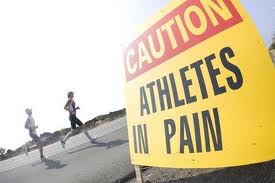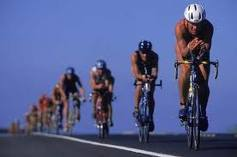by Mark Sircus., AC, OMD
(NaturalNews) In the world of sports medicine nutrient therapy can mean the difference between winning and losing and between health and injury. Besides attitude and training nothing affects athletic performance like an athlete’s nutritional profile because nutrients are the foundation of cellular function.
There are many things that you can do to improve your athletic performance. One of the most basic ways to improve your performance is through proper diet and dietary supplements, which can, when used appropriately add rocket fuel to your mitochondria and help reduce acid buildup thus reducing fatigue. When it comes to game day, you want to make sure that your body has the access to all of the nutrients and energy it needs to perform as efficiently as possible and this can be accomplished in the most proficient way with certain key nutrients.
Magnesium and bicarbonate are the most important minerals to sports nutrition. Their use for athletic performance can make the  difference between winning and losing and between sickness and health thus no serious athlete or sports medicine practitioner can afford to overlook these mineral salts. When magnesium is deficient things begin to die but when our body’s magnesium levels are topped off our body physiology tends to hum along like a race car yielding higher performance along many physiological parameters.
difference between winning and losing and between sickness and health thus no serious athlete or sports medicine practitioner can afford to overlook these mineral salts. When magnesium is deficient things begin to die but when our body’s magnesium levels are topped off our body physiology tends to hum along like a race car yielding higher performance along many physiological parameters.
In reality one cannot take a breath, move a muscle, or think a thought without enough magnesium in our cells. Magnesium deficiency reduces metabolic efficiency, increases oxygen consumption and heart rate required to perform work, all things that would take the edge off of athletic performance.
During vigorous exercise, people lose critical minerals through their sweat, the most important being magnesium. Adequate magnesium levels will help your body combat fatigue, heat exhaustion, and provide some measure of blood sugar control. Despite magnesium’s pivotal role in energy production and sports performance many coaches and athletes remain critically unaware of its critical importance in maintaining health and performance. Research suggests that even small shortfalls in magnesium intake can seriously impair athletic performance.
Athletes, who might be expected to take greater care with their diets, are not immune from magnesium deficiency. Studies carried out in 1986/87 revealed that gymnasts, football and basketball players were consuming only around 70% of the RDA, while the intake of female track and field athletes was even lower, as low as 59% of the RDA. Evidence shows that a magnesium shortfall boosts the energy cost, and hence oxygen use, of exercise during activities like running or cycling. One study of male athletes supplemented with 390 mg of magnesium per day for 25 days resulted in an increased peak oxygen uptake and total work output during work capacity tests.
Sodium bicarbonate (baking soda) facilitates the removal of hydrogen ions from the muscle cell so as to help maintain the muscle cell near its optimal pH for enzyme functions and energy production. The pH in the muscle cells is slightly alkaline while at rest. Normally, it is at this level that enzymes that produce energy via the lactic acid and oxygen energy systems perform at their optimum. As the concentration of hydrogen ions and acidity increases in the muscle cells optimal functioning of enzymes will be disturbed and energy  production will decrease.
production will decrease.
Fatigue results because of increased acid production within the muscle cell when the lactic acid energy system is used during high intensity exercise. During rest and exercise, proteins within the muscle cell help to buffer metabolic acids. But beyond the initial buffering in the cell, during exercise, the lactic acid produced appears to be buffered almost entirely by the sodium bicarbonate in the blood. Our body produces and uses plain old baking soda to protect its blood from acidity.
Only a few top coaches and sports doctors have understood and mastered the use of magnesium, bicarbonate and other minerals like potassium and calcium. The word few is used literally here for we are staking entirely new ground in sports medicine introducing not only Transdermal Magnesium Therapy but bicarbonate bath therapy, which bypasses all the gastrointestinal problems some athletes have when ingesting bicarbonate orally.
The last thing any trainer or sports doctor wants to see is their athletes lose their competitive edge. Not performing to full capacity because of the lack of vital minerals like magnesium and bicarbonate is simply not an option for winners. Athletic endurance and strength performance increases significantly when a large amount of magnesium is supplemented transdermally and orally and when bicarbonate levels are high enough to temper acid buildup.
Electrolytes
In reality a quartet of electrolytes play a critical role in muscle function and other biochemical processes. The loss of sodium is by far the most substantial and well-studied but the loss of and replacement of potassium, calcium and magnesium are also of supreme importance because over time all are lost through sweat.
Dr. Jonathan Toker, an elite-level runner-triathlete writes, “Extended periods of exercise at even moderate intensity can cause significant losses of fluid through sweating. Electrolytes, including sodium, potassium, magnesium and calcium, are present in this sweat at levels that over time will cause your body to become depleted. Muscle cramping, loss of performance, heat stress and other symptoms can result from reduced electrolyte levels and dehydration. Consumption of water will act to further dilute remaining electrolyte reserves and can exacerbate symptoms, even to the point of death. Common approaches by athletes to deal with these very real nutritional issues include consuming sports drinks and/or solid electrolyte supplementation (capsules). The following table illustrates the function of critical electrolytes and provides a target dose during fluid intake and overall daily intake range for active  individuals”.
individuals”.
Dr. Toker continues, “Both fluid and electrolyte supplementation are necessary during longer training and racing, depending on the athlete and conditions. Two competing factors, dehydration and hyponatremia, necessitate the balance between proper fluid intake and electrolyte intake. The key term here, “balance”, means that there is an ideal athlete- and condition-specific plan to optimize performance and minimize health risks. Whether the supplementation is a solid electrolyte and water or a sports drink, athletes ignoring one or both of these aspects do so with the peril at best of limited performance, or at worst, at a danger to their health.”
For all the references, sources and more articles, please visit Dr. Mark Sircus blog.
About the author:
About the author:
Mark A. Sircus, Ac., OMD, is director of the International Medical Veritas Association (IMVA) http://www.imva.info/.